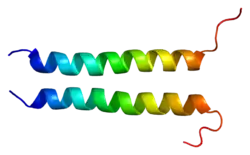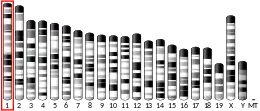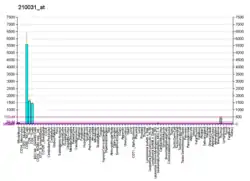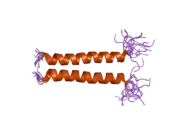CD247
T-cell surface glycoprotein CD3 zeta chain also known as T-cell receptor T3 zeta chain or CD247 (Cluster of Differentiation 247) is a protein that in humans is encoded by the CD247 gene.[5]
Some older literature mention a similar protein called "CD3 eta" in mice. It is now understood to be an isoform differing in the last exon.[6]
Genomics
The gene is located on the long arm of chromosome 1 at location 1q22-q25 on the Crick (negative) strand. The gene is 87,896 bases in length . The encoded protein is 164 amino acids long with a predicted weight of 18.696 kiloDaltons.
Function
T-cell receptor zeta (ζ), together with T-cell receptor alpha/beta and gamma/delta heterodimers and CD3-gamma, -delta, and -epsilon, forms the T-cell receptor-CD3 complex. The zeta chain plays an important role in coupling antigen recognition to several intracellular signal-transduction pathways. Low expression of the antigen results in impaired immune response. Two alternatively spliced transcript variants encoding distinct isoforms have been found for this gene.[7]
Interactions
CD247 has been shown to interact with Janus kinase 3[8] and Protein unc-119 homolog.[9]
See also
References
- GRCh38: Ensembl release 89: ENSG00000198821 - Ensembl, May 2017
- GRCm38: Ensembl release 89: ENSMUSG00000005763 - Ensembl, May 2017
- "Human PubMed Reference:". National Center for Biotechnology Information, U.S. National Library of Medicine.
- "Mouse PubMed Reference:". National Center for Biotechnology Information, U.S. National Library of Medicine.
- Weissman AM, Hou D, Orloff DG, Modi WS, Seuanez H, O'Brien SJ, Klausner RD (December 1988). "Molecular cloning and chromosomal localization of the human T-cell receptor zeta chain: distinction from the molecular CD3 complex". Proc. Natl. Acad. Sci. U.S.A. 85 (24): 9709–13. Bibcode:1988PNAS...85.9709W. doi:10.1073/pnas.85.24.9709. PMC 282845. PMID 2974162.
- PMCID PMC51840. PMID 1828894
- "Entrez Gene: CD247 CD247 molecule".
- Tomita K, Saijo K, Yamasaki S, Iida T, Nakatsu F, Arase H, Ohno H, Shirasawa T, Kuriyama T, O'Shea JJ, Saito T (Jul 2001). "Cytokine-independent Jak3 activation upon T cell receptor (TCR) stimulation through direct association of Jak3 and the TCR complex". J. Biol. Chem. 276 (27): 25378–85. doi:10.1074/jbc.M011363200. PMID 11349123.
- Gorska MM, Stafford SJ, Cen O, Sur S, Alam R (Feb 2004). "Unc119, a novel activator of Lck/Fyn, is essential for T cell activation". J. Exp. Med. 199 (3): 369–79. doi:10.1084/jem.20030589. PMC 2211793. PMID 14757743.
Further reading
- Geyer M, Fackler OT, Peterlin BM (2001). "Structure--function relationships in HIV-1 Nef". EMBO Rep. 2 (7): 580–5. doi:10.1093/embo-reports/kve141. PMC 1083955. PMID 11463741.
- Greenway AL, Holloway G, McPhee DA, Ellis P, Cornall A, Lidman M (2004). "HIV-1 Nef control of cell signalling molecules: multiple strategies to promote virus replication". J. Biosci. 28 (3): 323–35. doi:10.1007/BF02970151. PMID 12734410. S2CID 33749514.
- Stove V, Verhasselt B (2006). "Modelling thymic HIV-1 Nef effects". Curr. HIV Res. 4 (1): 57–64. doi:10.2174/157016206775197583. PMID 16454711.
External links
- CD247+protein,+human at the US National Library of Medicine Medical Subject Headings (MeSH)
- Human CD247 genome location and CD247 gene details page in the UCSC Genome Browser.
- Overview of all the structural information available in the PDB for UniProt: P20963 (Human T-cell surface glycoprotein CD3 zeta chain (CD247)) at the PDBe-KB.







